#numerical analysis
Explore tagged Tumblr posts
Text
look at my finite elements, boy
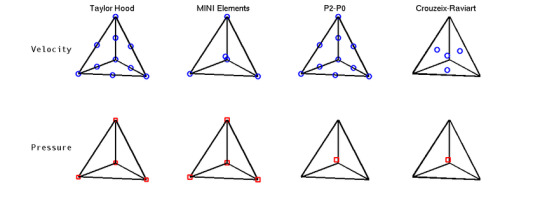
4 notes
·
View notes
Note
what area of math are you studying?
Hi there!
I'm starting my last year of undergrad this fall so I'm still studying all kinds of math and haven't specialized in one research area yet. If I go to grad school I'll specialize further. I am in a research group on graph theory though and this summer I'm working on some research in numerical analysis, which is super fun!
Thanks for asking!
5 notes
·
View notes
Text
Where is the line?
In the comics, Tim Drake's moral code is an enigma to me, particularly his stance on the Batclan's no-kill rule. For all the fans who say he's always one step away from full blown villainy, there are even more saying he's a strict goody two-shoes who could never stoop that low.
Then there's the different takes on where Tim draws the line between these two extremes. Personally, I find that line hard to pinpoint. Digging for canon demonstrations of his morals has lead me to more questions than answers. My biggest question right now is:
What counts as breaking the no-kill rule in Tim's eyes?
Luckily, the Robins 2021 comics shed some light on this. In issue #3, "Tim", or rather an imposter of him, said that choosing not to save someone isn't the same as killing them, and that letting a villain die can be a way to get justice. Normally, this point would be moot since it's not Tim himself who said it. However, at the end of issue #6, the real Tim clarified that what the imposter said WAS his real opinion on the matter.
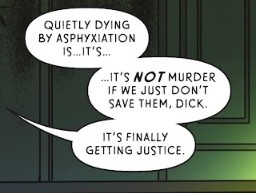
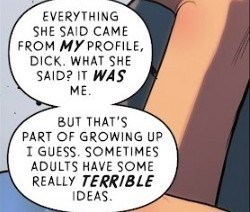
Not only that, but Tim has shown this belief through his thoughts and actions before. Twice.
The first time goes all the way back to Robin 1991 #5. During the fight against King Snake, Tim kicked him through a nearby window, fifty stories above the ground. As King Snake's life hung in the balance, Shiva appeared and commanded Tim to kill him.
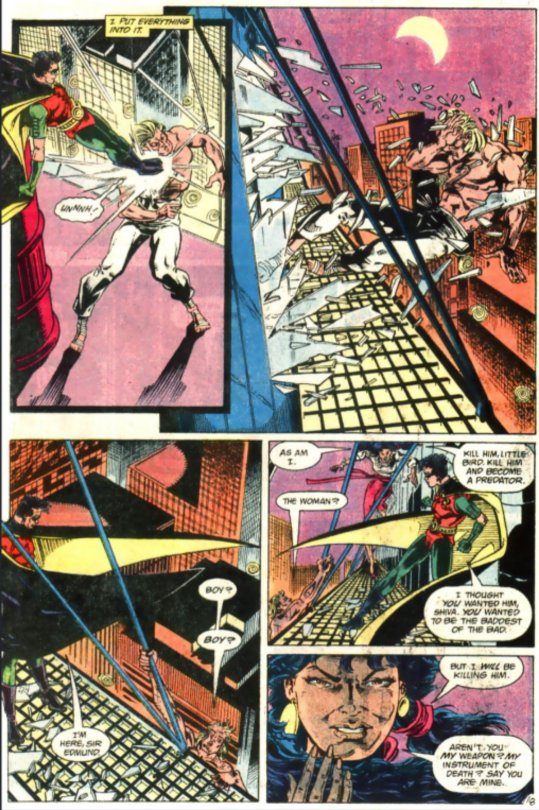
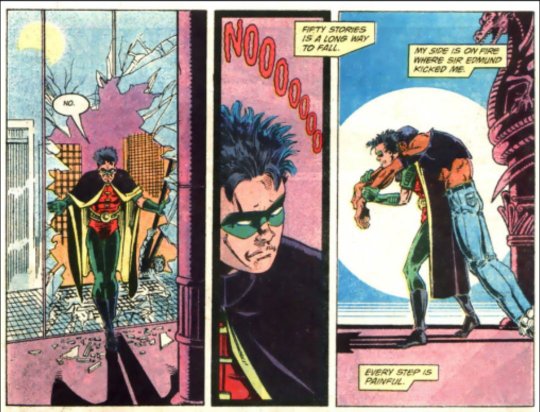
Tim refused. He walked away, leaving King Snake entirely at Shiva's mercy.
What gets me is that Tim made no move to save King Snake from falling. And he made no effort to stop Shiva from committing the murder, either. His only thought as he heard the man's scream was "Fifty stories is a long way to fall."
The second time was in Red Robin 2009 #26. Tim orchestrated a whole plan to manipulate Captain Boomerang into getting killed by Mr. Freeze. The whole time, Tim blamed Captain Boomerang for making all those bad choices, despite Tim being the one raising the chances of them being made. Tim believed he was innocent because he wasn't directly participating.
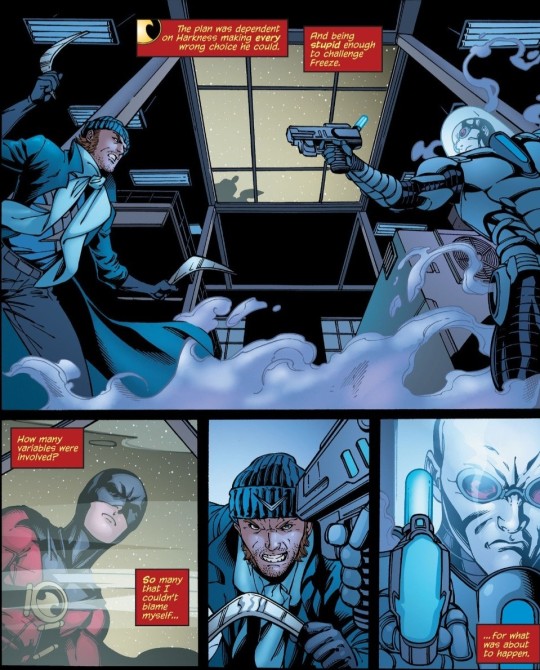
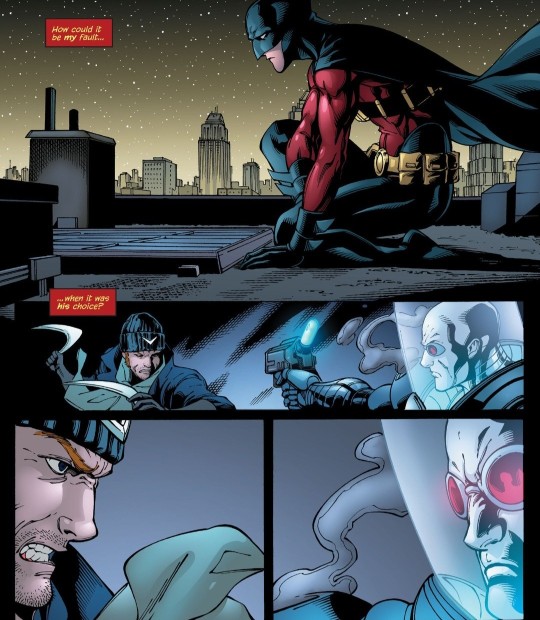
Tim then stopped that plan, but not for any noble reason. He decided that he couldn't let anyone else kill Captain Boomerang but himself.
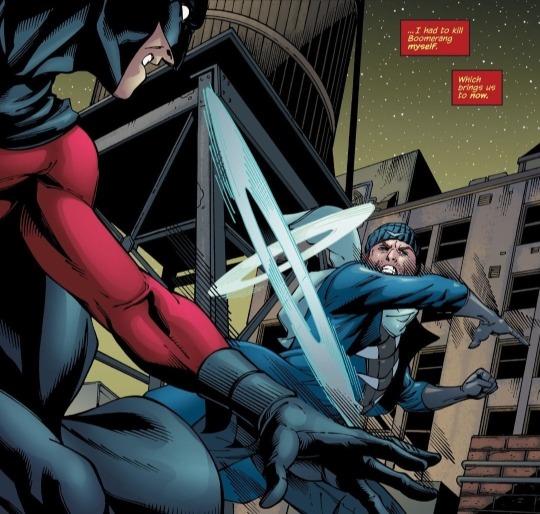
Tim couldn't bring himself to do that, either. So he had to spare his father's killer in the end.
This seems pretty cut and dry so far, right? Tim believing that letting villains die is alright as long he doesn't do the deed himself? I'd think so too, if there weren't other moments contradicting this.
In Robin #35, Steph insisted on leaving an enemy who got buried under the snow to die. Tim chastised her for it.
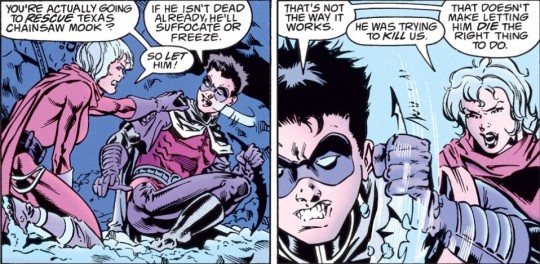
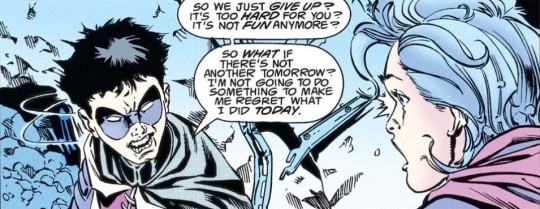
Neither of them were responsible for the snow, or for the enemy getting trapped in it. Plus, that guy tried to kill them with a chainsaw moments prior, so he's not exactly an innocent damsel in distress.
Maybe it was because this enemy wasn't a big enough fish to fry. We didn't really get confirmation that this guy has actually killed before, and he's around goon status at best.
But then in Robin #46, Tim chose to save another enemy who got himself into a deadly situation. That enemy was a murderer known as Young El. This time, Tim wasn't telling anyone else why they should save a murderer's life out loud. These were his private thoughts.
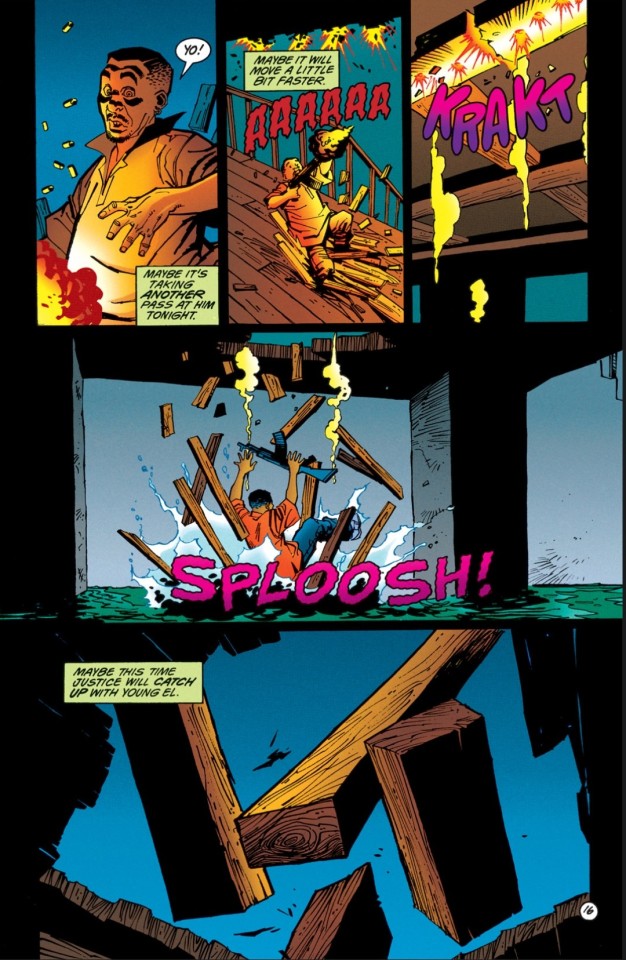
Notice how Tim's inner monologue sounded kind of on-the-fence. He contemplated justice finally catching up with Young El as the floorboards gave way, bringing a support beam down on him in the process.
However, Tim immediately switched gears to rescue Young El from under that beam before the water rose too high.
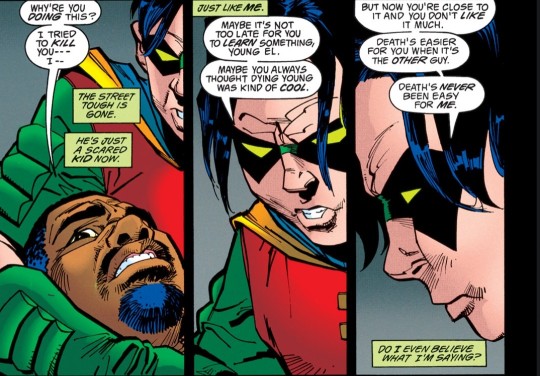
But Tim, as he told Young El the reasons he's saving him, asked himself "Do I even believe what I'm saying?" He could be asking this about two different things he said here. A) "Maybe it's not too late for you to learn something, Young El.", or B) "Death's easier for you when it's the other guy. Death's never been easy for me."
For Tim to doubt his belief in either of these statements is very interesting. He could be questioning if Young El is already too far gone for redemption, or he could be questioning if seeing someone die has never been easy for himself. For all we know, it could be both.
Unfortunately, Tim never got to see if his choice to save him would pay off. Tim wasn't strong enough to lift that beam, and Young El drowned.
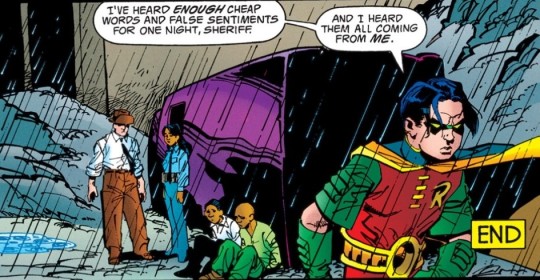
There's a question on my mind as I read these pages. What makes this murderer's death different from when Tim let King Snake fall to his "death"? Sure, King Snake didn't actually die, but Tim didn't know that until later when the man came looking for revenge in Gotham.
Tim was once able to simply walk away from what he was certain would be a killer's demise. But then he's consumed by guilt over not being able to prevent a different killer's death down the line, to the point of hallucinating.

On top of that, what changed Tim's mind later? Red Robin #26 and Robins 2021 #3-6 still happened in the future. The only significant difference I can tell is that these two comics involved the killer's of Tim's parents, making it personal. But if the Imposter from Robins 2021 got his beliefs from his profile before his mother's killer got involved, then does that still hold up?
Maybe we should put a pin on it for now. There are other things Tim's done that brings the details of his no-kill rule into question.
Such as that one time Tim actually killed someone with his bare hands.
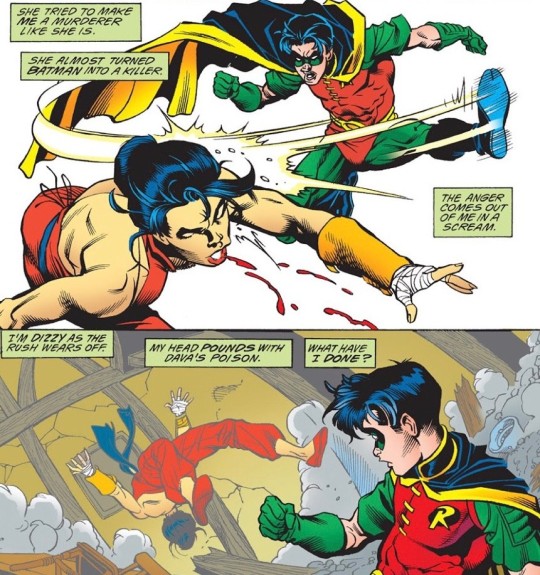
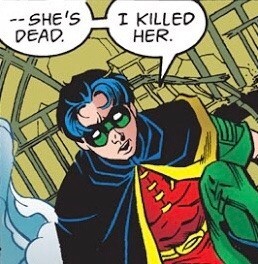
In Robin issues #51-52, Tim accidentally killed Lady Shiva while drugged on amarilla, a plant that enhances the user's speed beyond human limitations.
It may be argued if the amarilla altered Tim's mind enough to excuse him of fault or not. However, I want to focus on what happened after Shiva was revived. Here's another question to go with the first one:
Does Tim believe the kill still counts if the victim was revived afterwards?
From what I've gathered, yes and no. It's kind of complicated.
After Tim killed Shiva, he was understandably distressed about it, about how he can never take it back.
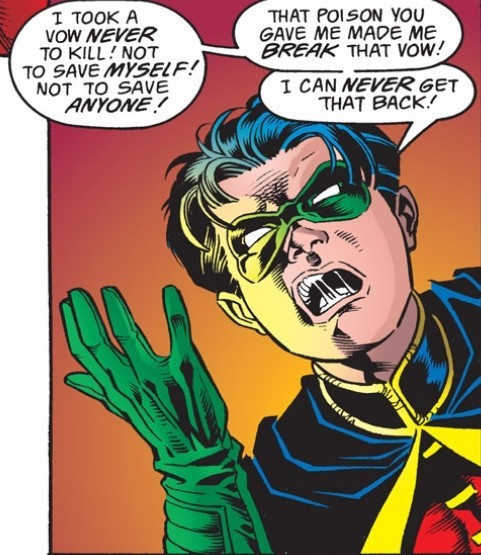
But after Shiva came back to life? Nothing. He didn't dwell on the fact he broke the vow to never kill. For something that devastating to happen in his life, it's odd that Tim didn't bring it up ever again, privately or otherwise. Especially considering what happened later in Robin #123, when Tim thought he killed Johnny Warlock.
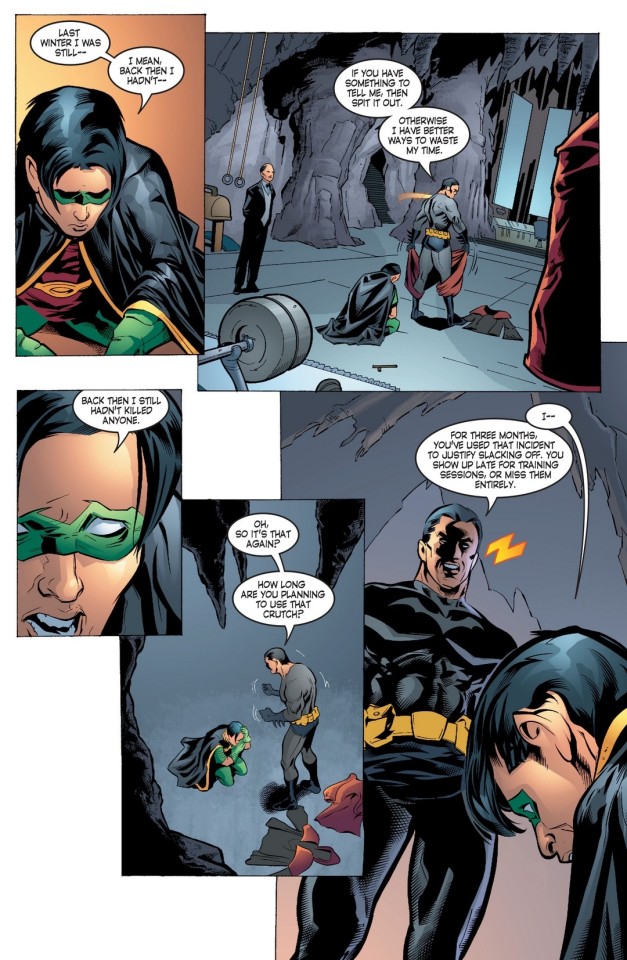
Tim was utterly inconsolable. He lost all faith in his abilities as Robin, and in himself as a whole. It also contributed to his decision to quit being Robin after his dad found out. In general, he seriously dwelled on that "kill" for a much longer time than he had after killing Shiva. The difference being that he knew Shiva was resuscitated immediately afterwards, while Tim didn't know Johnny survived until issue #141.
But there's the fact that Shiva really did die. Her heart and breathing both stopped. So are we to believe Tim moved on from that so easily because she's alive now? What happened to never getting that back?
Come to think of it, not long after Tim killed and revived Shiva, there was someone else who landed in that same boat. Dick.
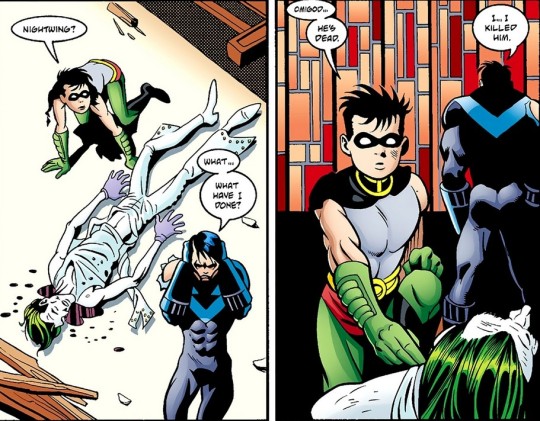
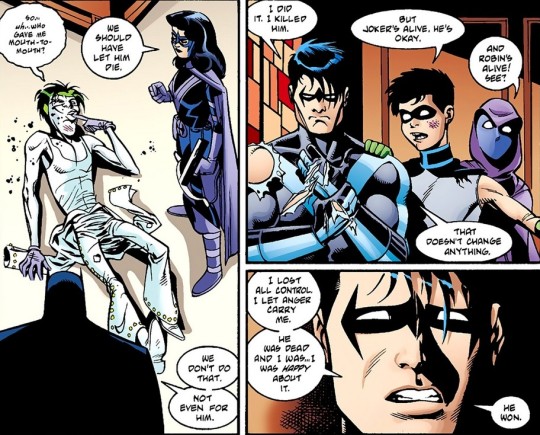
In Joker: The Last Laugh #6, Dick brutally attacked the Joker after believing he killed Tim. Dick ended up accidentally killing Joker instead, before the clown was resuscitated.
Here's the thing. While Tim was trying to comfort Dick, saying that it's ok because Joker's alive now, Dick didn't believe so. He was still distraught that he killed someone. The fact Joker came back to life afterwards didn't matter to him. To Dick, it still counted. So what does that say about Tim?
Before we move on, there's another person Tim knows who also died and came back from the grave. Jason.
Tim openly acknowledged Jason was killed before coming back, too. Multiple times. For example, when they met up in Red Hood and the Outlaws 2011 #8.
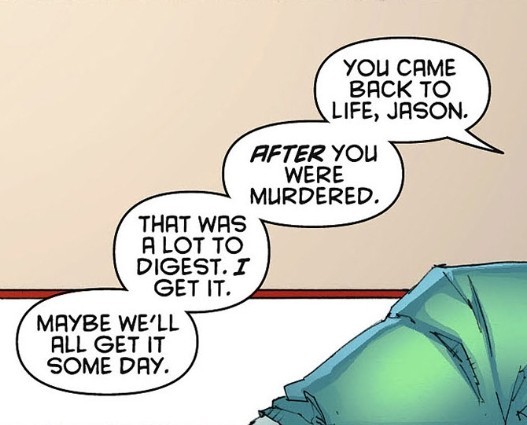
Tim hadn't shown any signs that he thinks Jason's murder doesn't count anywhere, except for maybe once.
In Knight Terrors: Robin #2, Tim and Jason had a heart-to-heart, and Tim said something strange.
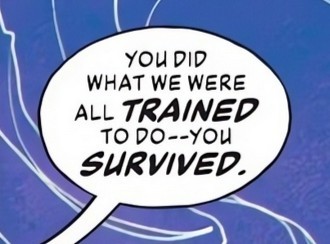
"You survived."
Except Jason didn't survive. He died. To say Jason survived that night would've meant he never died to begin with. Him being alive now doesn't change that. Was this Tim telling a white lie to make Jason feel better? Or does Tim see being revived after death as "surviving"?
Ok, now we can move onto the next question. Or rather, bear with me as we go back to the first question. It's a broad topic with plenty more to talk about.
What does Tim count as breaking the no-kill rule?
We already asked how Tim feels about bringing villains back from the dead after killing them. And we asked how Tim feels about leaving a villain to die without getting directly involved. However, we still don't know how much involvement Tim needs to have in an enemy's death before he'll take responsibility for it.
We can confirm he won't mercy kill in Red Robin #21, even if it means giving someone a fate worse than death. No exceptions.
Tim also doesn't allow anyone he's actively teaming up with to kill, especially if he's the one in command. He's been amicable with known killers before (Huntress and Pru, for example), but only when they remain non-lethal while working alongside him.
Apart from that, though, it becomes less clear. However, I think this is a good place to expand on when Tim blew up a lot of League of Assassins bases in Red Robin #8.
I'm not going into whether or not those explosions actually killed anyone. I've seen evidence supporting both sides of this debate, so I'm just going to say it's up to interpretation. What I AM talking about is whether or not Tim would've felt responsible if they had killed someone.
Before overloading every generator in the LOA database, Tim gave a warning to the Wanderer. He told her that he couldn't be held responsible for what would happen to her if she didn't leave.
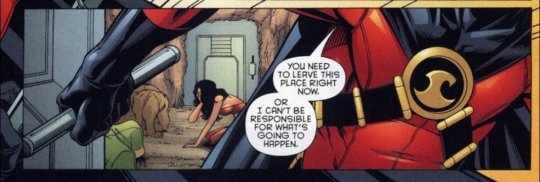
After initiating the explosions, Tim warned the White Ghost that they had fifteen seconds to leave before it was too late.
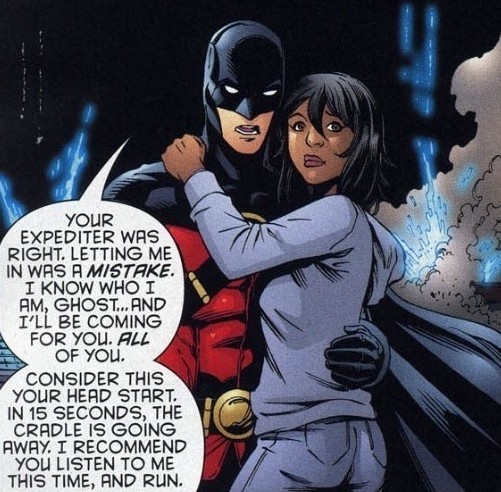
Fifteen seconds. That explanation on the mistake of letting him in might've taken roughly another fifteen to twenty seconds. Did the other bases even get a full minute head start? The way some of the people were already running away could imply they at least got a warning, but it's possible they might not have.
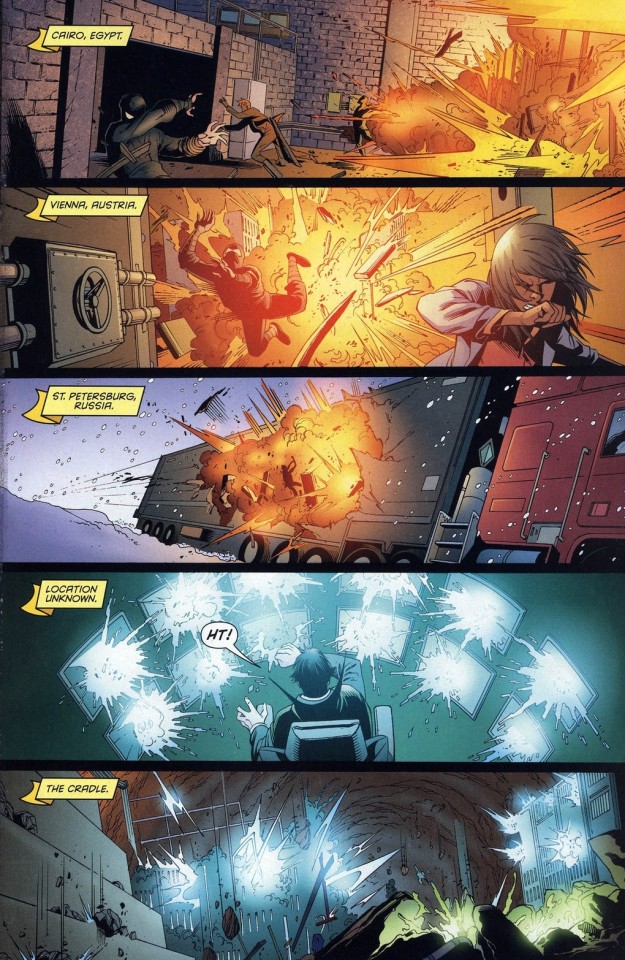
Even if everyone in every base received a warning, would that be enough for Tim to avoid holding himself accountable if they didn't make it out in time? Tim's the one who rigged the bases to explode, but I guess giving someone a warning means it's now their fault for not heeding it?
We can't be sure he even considered the possibility of those explosions killing anyone. Tim knew they were dangerous enough to bring the whole Cradle down, and the other ones we saw looked pretty powerful (except the ones in Ra's hideout). But Tim also called Ra's a murderer right after that happened, which would've been very hypocritical if Tim himself thought he committed murder.
So, my guess is either A) Tim relied on sheer luck for those explosions not causing any casualties and chose to believe they hadn't, or B) Tim didn't believe the deaths of anyone caught in them would be his fault.
Again, this isn't about whether or not blowing up the LOA bases killed anyone. It's about how willing Tim was to take that risk, and if he would've blamed himself for anyone getting killed from it.
Either way, it's canon that Tim had no guilt for the explosions he caused, or for anything he did before Red Robin #22. Just ask the Sword of Sin.
This is an exerpt I got from the Fandom DC Database on the Sword of Sin:
"The Sword of Sin can be ignited with the mind of the wielder, if the person is powerful enough. The sword has the ability to conjure in the mind its victims all of the sins for which they are guilty or have not atoned for."
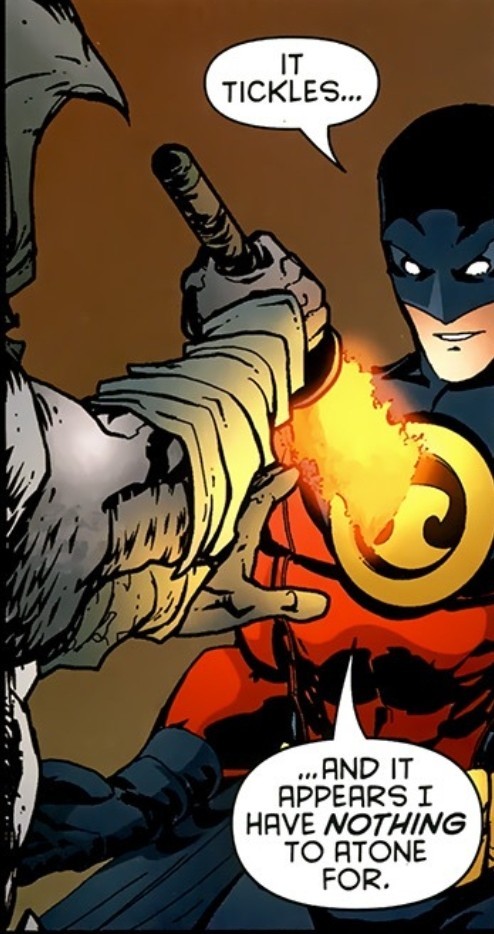
When Tim was stabbed with this sword, he was immune. The Sword of Sin decided he was innocent. Although, I have to ask how reliable this sword was in making that judgement. If the sword is judging others based on its own set principles, then something's not right here.
The Sword of Sin was also used on Dick, and he wasn't immune. It dug into Dicks subconscious and unearthed memories he'd long since repressed. Memories of himself watching a boy get beaten to near death, and then doing nothing. He just walked away.
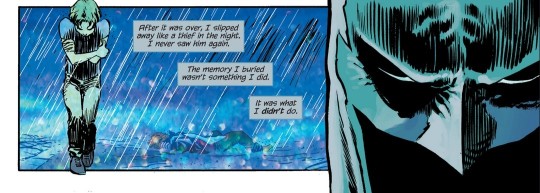
Now, tell me why the sword brought this to light, but not the time Tim left King Snake to die!
It wasn't an accident. Tim deliberately chose to leave instead of trying to save this man from the murderous Lady Shiva. Sure, Tim was no match for Shiva and he might've not been able to stop her, but the same could be said for an eight year old Dick not stopping a group of much older kids. Neither of them tried to stop the attackers.
Tim didn't atone for it, either. When King Snake returned in Batman #469, Bruce told King Snake that it wasn't Tim who left him to die. We know that's a lie, but Tim never corrected this. He let Shiva take all the blame.
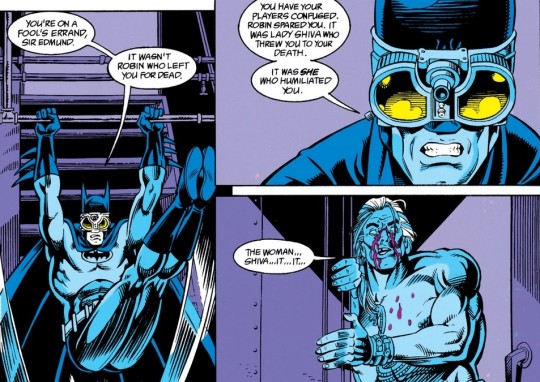
We have two instances of a boy choosing not to prevent someone from having a near death experience. One guilty, and one innocent.
Did the Sword of Sin think Tim was justified because King Snake was corrupt? That doesn't sound holy to me.
Was it because Tim didn't feel any guilt over it, while Dick did? Can the sword's judgement be thrown off by the victim not feeling any shred of guilt over their actions, even subconsciously?
That could make sense given what we know Tim did in the past: King Snake falling, the vandalism (explosions), and ALL the lying over the years (Tim reviving Shiva might count as atonement, so I'm not including that). If the sword based its judgement on God's will alone, then odds are high it would've picked up on one of these.
Even so, I'm not going to sit here and say this is definitely the case. I'm not familiar enough with how the sword effects other characters to make that call.
If this is indeed false, then did the DC universe's version of God decide to pardon Tim of his sins when he prayed earlier that same issue, despite him not believing he had any? I mean, who knows, right?
You can probably see why there's more questions than answers. The point is Tim didn't have any guilt for the things he did before Red Robin #22. Tim was canonically convinced he had nothing to atone for.
So then why did he say the opposite later in Knight Terrors: Robin #2?!
In the heart-to-heart between Tim and Jason, Tim tells him this:
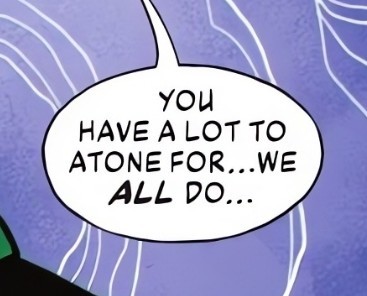
"You have a lot to atone for...We all do..."
Tim knows that the words "we all" include him, right? By saying this, Tim admitted to also having things he needs to atone for, right?
Is this another white lie to make Jason feel better? Is it one of those slight changes the New 52 made to the canon? If not, then why did he change his mind? Did his no-kill rule change and make him feel guilty for some past actions? Is it not the no-kill rule, but something else?
What changed?!
Where does Tim draw the line?
I don't know. We've narrowed it down to a general area, but it's kinda hard to see a line when it's so blurred it could be a gradient.
Tim baffles me. He acts as a steady moral compass for others when he can't even seem to stay consistent with his own. You're free to call it poor writing (and honestly, fair), but I find his hypocrisy fascinating.
That's what it is, isn't it? Tim's a hypocrite who's completely oblivious to being one. And it's not like this was never mentioned in the comics before. Damian called him out on it!
In Batman & Robin 2011 #10, Damian confronted Tim about his near-murderous reaction when Fist Point killed Artemis (Teen Titans Vol 4 annual #1). Damian then accused Tim of constantly rejecting him because they have more in common than Tim's willing to admit.
It's debatable how accurate that accusation was, but Tim had a pretty volatile reaction to it.
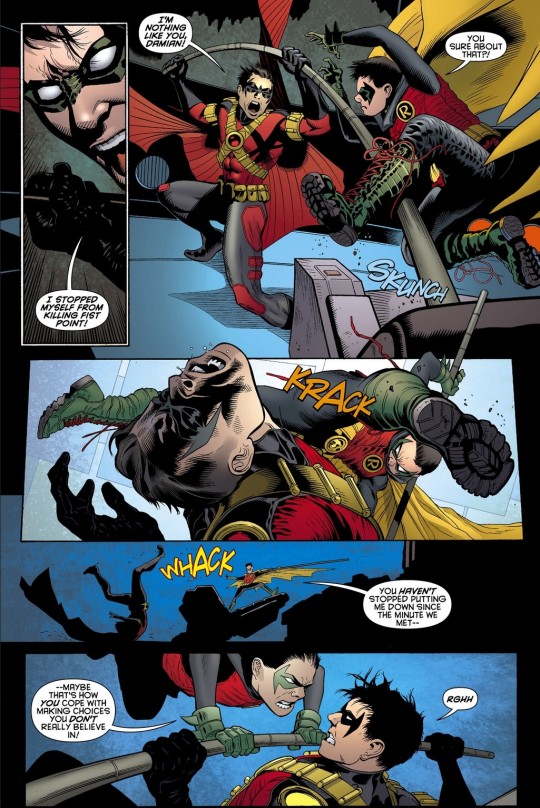
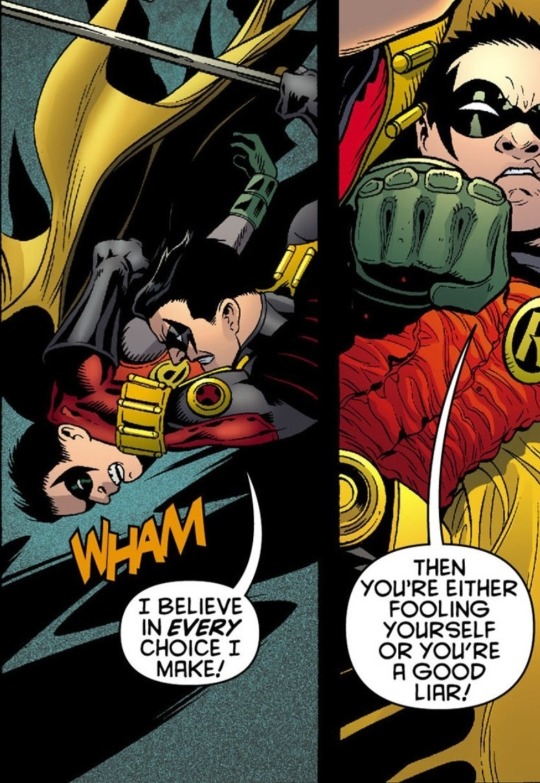
"I believe in every choice I make!"
Does he? I don't think someone who's so sure of what he believes in would contradict himself to this extent. Especially if he wasn't doing it on purpose.
He wouldn't vehemently push Bruce's no-kill rule onto others and berate them for bending that rule, only to go and bend that same rule himself when the Batclan isn't around. He also wouldn't exploit what he thinks are loopholes, decide later that those loopholes broke the no-kill rule, and then earnestly claim he never broke it.
Why is he like this?! He's had arguably the most normal childhood out of the whole Batclan before becoming Robin! What could've made him so fickle about this?!
Where does he draw the line? And how will he know when he's crossed it?
#batman#dc#robin#tim drake#red robin#theory#analysis#long post#tim drake is a menace#unhinged tim drake#To think all of this was written without mentioning Tim's corrupt future selves#or the numerous times he's actually contemplated or attempted murder#Believe me I would've loved to add 5-10 more screenshots of those moments alone#but I hit the 30 image limit :(#Anyway I want to study Tim in a lab#Feedback is welcome#I'm aware I hadn't read all the DC comics so I could've missed something
804 notes
·
View notes
Text


juno as jason's patron and mother / gaea as hazel's patron and mother. jason was forfeited by his mother and his father and given to juno while gaea possessed hazel's mom - and so the earth actually became hazel's mother
both goddesses demand that they perform labor in direct service to their bodies. juno has to be rescued from prison. hazel must raise alcyoneus from gaea's womb. mother as patron and patron as mother. these titles are indivisible from ownership in the mind of a deity
#I get why people enjoy percy and jason parallels but like hazel is right there and the parallels are better lol. I had a whole big post#about the numerous ways in which their stories mirror each other#what if instead of full blown analysis I just start posting book quotes side by side with a brief caption and assume you guys will Get it#there's a lot to dive into here 🤔#jason grace#hazel levesque#heros of olympus#pjo hoo toa tsats#percy jackson and the olympians#jasonposting#hazelposting#baye.txt#bayemeta#<- maybe that'll be my analysis tag now idk#pjo character analysis
115 notes
·
View notes
Text
i was having a pretty good day ngl, but then i was forced to bare witness to another “NINE BAD AND EVIL!!!!!” video
#graveyardtxt#dude that video has to be rage bait#anyway the bait worked. but it worked solely because i’ve never been so dumbfounded by someone’s misinterpretation of nine’s character#it’s genuinely the worst analysis of nine i’ve ever seen#“he became evil because he was bullied and was a loser’’ DO YOU HEAR YOURSELF#did you miss the part when nine said the harassment lasted for years?? that he was basically outcasted from society???#did you miss when he believed that sonic betrayed him and wanted to erase his existence?? did we miss that entire scene??#istg this guy only watched season 3#nine isn’t just “bully victim become evil!!!’’ character. he wasn’t the antagonist until season 3#and he became the antagonist because of the numerous miscommunications between him and sonic#ripping my hair out#i thought people misinterpreting nine this badly was a myth. maybe even a twitter phenomenon#but i was mistaken#miles nine prower#sonic prime
44 notes
·
View notes
Text
last exam of my undergrad career is shaping up to be long & annoying contour integral hell times
(granted the entire course has been long and annoying integral hell, so... I suppose that's fitting for the final? still doesn't make me want to do it any more)
#chattering#the material in the class has been interesting- complex numbers are cool! fourier analysis is cool!#the actual work itself has been so incredibly tedious and annoying!#and I'm looking at this practice final exam like. okay cool we've got a question on contour integrals#okay cool we have a question on fourier transforms- oh wait nevermind we have to do 4 more contour integrals for this problem#like just skip the contour integral question if you're going to be testing me on my ability to do it later! this is so fucking repetitive!#gonna be honest we're mailing it in on this one a little bit even though it's 50% of my grade#no clue how I'm doing in the class because the mapping from numerical to letter grades is not clear whatsoever#also did I mention that the TAs haven't graded homework since the end of February?#anyways on vibes alone I am on track for a B which is fine with me
10 notes
·
View notes
Text
Everyday I see another youtube video or whatever say smth along the lines of "this character is badly written because they're unlikable/annoying/insert negative description here" and everyday I end up massively disappointed because I came here for analysis on the actual writing of a character not just a description of the feelings they made you experience
#rat rambles#like when criticizing a character's writing its important to understand that a character being unlikable to you isnt always a failing on#the writing and when it is you have to actually explain Why it doesnt work in the context of the story and narrative for it to be#meaningful criticism in my opinion#for example a lot of ppl complain abt unlikable protagonists in very unproductive ways imo#because narratively speaking protagonists who kind of suck ass as people very much can have their place#so I always get disappointed when I see ppl talk abt the cases where I agree that theyre poorly written and not getting any elaboration#upon the initial 'they do bad things and are a bad person therefore I dont like them'#like there are plenty of ways for a character to be unlikable and a bad person or whatever#just please explain to me Why you think that the character themself was misandled or otherwise poorly written without listing their crimes#like for example. and lets all get our long sighs out first. sighhhhhhh. ok. shuichi.#hes a bit of a prick. anytime Ive seen criticism of his character it basically amounts to that statement.#and that doesn't at all adress any of the actual numerous problems with how hes written.#thats just a description of a character trait. which isnt a writing flaw on its own.#the reason him being an ass is a problem is that he is meant to be and written as a camera pov protag#so all of his judgy bullshit is meant to be how the audience feels too. which causes problems in a game where you're supposed to give a#shit abt the cast and want to hang out with them and get attached before they die horribly#and this is a problem that exists in all dr games ofc but shuichi just makes it most obvious because the v3 cast was built with a lot more#malice than the other two casts generally speaking#ok thats enough shuichi talk Im so sorry for making yall see that I promise it wont happen again its just the easiest example to draw#basically: poorly written characters are pretty much never that way because of any isolated traits they have as people#its about How they are written and positioned in the narrative#saying a character is bad because theyre annoying or unlikable is just saying theyre bad because you dont like them#and its plenty easy to not like well written characters so if you wanna make a real point then stop just writing a callout doc#like half the time your issue is with narrative framing not with the traits themselves talk about that instead thats much more interesting#and I Dont mean 'oh a character we're supposed to like shouldn't have this negative trait' because thats also unproductive#generally speaking saying that any certain character trait is inherently linked with bad writing beyond being a sentiment I disagree with#is also just not a very helpful statement for actually understanding what the actual problem is#and for me the why is what character and literature analysis is all about#and in terms of media criticism its especially important since you don't exactly learn anything by being told a character is unlikable
2 notes
·
View notes
Text
help the adults are flirting
Sifo-Dyas shifts the books to carry them under one arm and with the Force. He points at Madame Nu. “Hego Damask is?” “A Sith Lord somehow employing a wide-reaching variety of a mind-control spell to ensure that anyone who learns this fact forgets it very shortly after?” “Yes!” His head jerks forward under a Force-assisted backhand to the back of his skull and recovers just in time for Madame Nu to stalk right up into his personal space and shove her face up so far their noses almost touch. “Maybe just Jedi,” I offer. Neither of them looks away from each other but I can feel their focus expand to include me. “When did you figure this out?” Madame Nu asks, pleasantly. The hawk has her prey pierced with a claw and is studying it to see if it's still worth playing with. “More importantly, how did you figure this out?” “Data is still outstanding,” Master Si says, affecting the air of an academic disappointed in their own experiments. His bottom lip juts out the teeniest bit. Do I look like the type of person who would lie? To you? About data? “We are observing subjects to see if our hypothesis is supported.” “You believe this forgetting is limited to the Jedi Order?” “Stop being an outlier, Jocasta.” “Stop being a brat, Sifo-Dyas.” “I’m going to go be elsewhere,” I say. It's very superfluous in this instance. I'm very superfluous in this instance. “And make an appointment with Galactic City planning to look at the old land deeds for this site.” I shift my weight to beneath my ankles so I can tap the floor with my toes. “Other … archives?” If Madame Nu could turn her head upside down like an owl I think she would be doing so right now. Aw, Sithspit. Run. Master Si accompanies the suggestion with a shooing motion. “Over the past thousand years the line of Bane has managed to steal almost all of the Sith holocrons from here so they're pretty much all fakes now. At least one is a disguised listening device. Bye.” I practically skate out of the archives, using the lack of friction between the floor and the bottom of my slippers to make a quick getaway.
#keeping up with the skywalkers#galaxies far far away may be closer than they appear#sifo's pet name for dooku: doo; sifo's pet names for jocasta: numerous. all based on data analysis.
5 notes
·
View notes
Text
Seeing people write off Viviana as mid when she's at SL7... She gains 47% more damage with her masteries. How many times must we do this?
#arknights#viviana arknights#lazy numerical analysis may not be the worst thing#but it is one of the most annoying to me personally
13 notes
·
View notes
Text
well.. amazing period!!! yay boyos!!
4 notes
·
View notes
Text
learning python rn and nothing boosts your confidence like finding the bug while the person teaching you is coding live
#also just. actually learning coding in general#bc like. for all of my comp sci osmosis I really never learned coding basics#took a matlab course once where I had to create functions with loops#and then never used matlab beyond translating pseudocode from textbook problems for numerical analysis hw#similar story for using R#my coding knowledge is passably being able to Google how to do basic things in various semi coding languages as needed#but bc it’s so spotty it’s like. evil rn#do I know about Turing machines and unsolvable halting problems????? yeah#do I cobble together the most atrocious and dangerous misuses of the one or two commands I know#to do a thing easily done by a basic function????#also yes#I need to like. learn what the things do on a fundamental level so I am not misusing them in evil ways basically#456 words
3 notes
·
View notes
Text
((One of the more subtle things that I hope is brought up in more detail is the efforts that Flynn and Bo go to in order to restore Kariom's memories. In no particular order we have: conversation, exposure to places and important objects, keeping multiple journals/diaries, playing recordings of his voice back to him, legitimately hypnotizing him, and so on.
A few of these things? Fine, normal even. But the escalation is stark and all it really shows is that neither Bo nor Flynn know what to do or how to help and they make it incredibly clear that the things they've tried aren't foolproof. Even Bo's reasoning for giving Kariom a camera and having him take Flynn and Bo's picture directly references it:

((The gesture and gift itself is very sweet (and I'm sure Kariom would love to have a camera, that's very fitting for him) but the underlying reason? The adding on to the efforts/measures they can rely on to restore his memories without nary a mention of anything else on top of knowing that it's not going to work long term if at all? That just makes it.....sad. No, not just sad: it's desperate. It's a reality made worse by how unbothered Bo is and by how bothered Flynn is---Flynn even makes a sarcastic remark and then reminds Bo that the journals didn't work and so why would photos---and how more and more they're (seemingly) on opposite sides. They're fighting a losing battle and only one of them is actively pushing for it to be stopped.))
#;;ooc: mun muttering#I have a lot of feelings about this situation (obviously) and have gone on about it from various angle numerous times I know;#this is veering into an hc + analysis I have for Bo actually (and it's a big one) so I'll hold off a bit#to say nothing about all of the things I've said (and still want to say) about Kari and Flynn; hc and otherwise#but sometimes it's easy to miss shit---to miss build up---and I do like to natter on so....yeah#;;ooc: commentary (flynn)#;;ooc: commentary (bo)#;;ooc: commentary (kariom)
3 notes
·
View notes
Text
isaac newton.
everyone's all about queer subtext until it's aromantic or asexual
#also i hope this doesn’t come off like snarky i’m bad at tone#but their sexualities aren’t ‘completely unknown’#there’s nuance and ambiguity to them obviously#but like i wouldn’t call it imagined.#i don’t think that’s fair to the historians who put real work into reading and analysing#the numerous pieces of evidence toward those identities#but also like#this is tumblr not an academic article#and that’s sort of just a nitpick#i assume thats just a speaking kinda broadly thing#anyway#there are actually a lot of interesting figures#who were likely on the aroace spectrum#you have to dig a little harder to get hard analysis on it#which does suck yeah#but like it is there#sorry i like going on tangents down here#completely get the original point obviously#(also relevant in fiction n by that i mean gandalf aroace agenda when)
52K notes
·
View notes
Text
Computational Fluid Dynamics (CFD) for engineering solutions
Please contact us to support your projects with high fidelity CFD modelling analysis.
#engineering#design#cfd simulation#numerical modelling#simulation service#engineering analysis#fluid dynamics#fluid flows#rotating machines
0 notes
Text
Military - Imposters purporting to be people from or who were on this planet are numerous - perform detailed energy signature analysis and comparison on any who left or supposedly leave this planet
#imposters purporting to be people from or who were on this planet are numerous#imposters purporting to be people from or who were on planet earth are numerous#perform detailed energy signature analysis and comparison on any who left or supposedly leave this planet#perform detailed energy signature analysis and comparison on any who left or supposedly leave planet earth#military
0 notes
Text
Okay, this made me crack a smile.
Hell's Bad Books
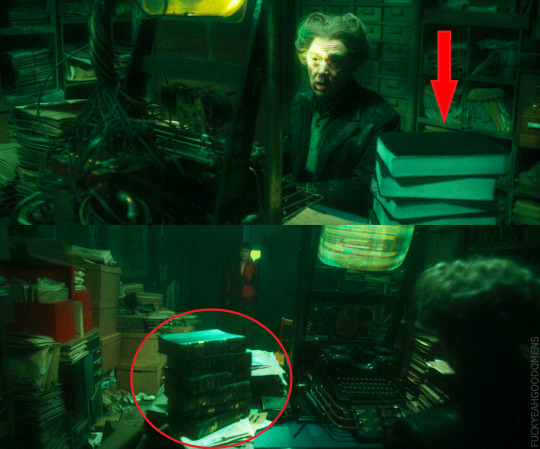

From the Good Omens book :):
He'd taken the opportunity to reread Aziraphale's notes, and to thumb through Agnes Nutter's prophecies, and to do some serious thinking.
His conclusions could be summarized as follows:
Armageddon was under way.
There was nothing Crowley could do about this.
It was going to happen in Tadfield. Or to begin there, at any rate. After that it was going to happen everywhere.
Crowley was in Hell's bad books. *Not that Hell has any other kind.
Aziraphale was—as far as could be estimated—out of the equation.
All was black, gloomy and awful. There was no light at the end of the tunnel—or if there was, it was an oncoming train.
He might just as well find a nice little restaurant and get completely and utterly pissed out of his mind while he waited for the world to end.
And yet . . .
#one would think hell's bad books would be much more numerous#good omens#good omens 2#back on my good omens bs#good omens analysis#“analysis” more like fun easter egg but for filing purposes it goes in analysis
702 notes
·
View notes